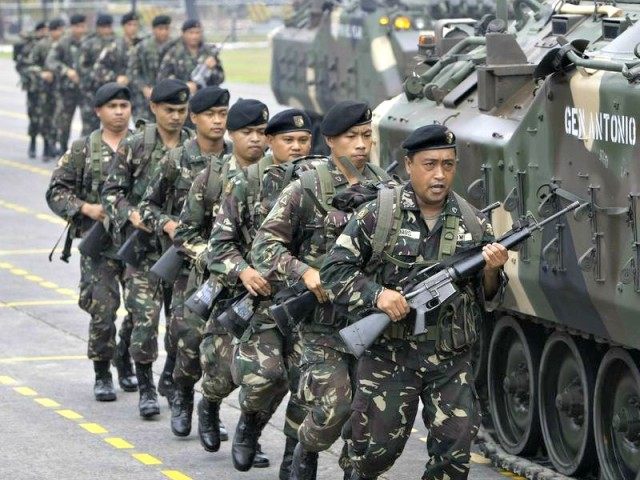The chief officers of the Philippine military and U.S. Pacific Command said military ties between the two countries remained “robust” on Tuesday, despite threats from Philippine President Rodrigo Duterte to reduce cooperation with America in favor of stronger relationships with China and Russia.
The Associated Press reports this “upbeat statement” followed a Mutual Defense Board and Security Engagement Board meeting co-chaired by Philippine General Ricardo R. Visaya and U.S. Admiral Harry B. Harris.
“The successful completion of the MDB-SEB ensures continued, robust relations between the U.S. and Philippine militaries,” the statement read. “This highlights the enduring commitment of both countries to the U.S.-Philippine alliance.”
The statement anticipated continued cooperation on “humanitarian assistance and disaster relief, counterterrorism, cybersecurity and maritime security.”
The Philippine military has, however, said that it wants to scale back joint drills from 13 to 6 or 7, scrap two naval exercises that include territorial defense training, and refocus training on “humanitarian assistance, disaster relief, and counterterrorism.”
The proposal was reportedly presented to Duterte earlier this month, and to the American government on Tuesday. On Wednesday, it was reported that five joint military exercises with the United States would be scrapped on President Duterte’s orders.
The two naval exercises referenced above, the Philippine Amphibious Landing Exercise and Cooperation Afloat Readiness and Training Exercise, were also canceled, because Duterte did not want any more “showy war games,” according to a military spokesman.
That is indeed more “upbeat” than previous outbursts from Duterte, who threatened just a few weeks ago to eject all U.S. troops from his country within the next two years. There are currently about 600 American troops stationed in the Philippines.
Prashanth Parameswaran tries to reconcile these conflicting signals at The Diplomat, and concludes “we were always more likely to see a downgrading in U.S.-Philippine defense relations, as opposed to a full-blown severing.”
Parameswaran thinks some of the panic over degraded U.S.-Philippine relations was due to “sensationalist reporting on the exercises” that would be cut and “Duterte’s own superficial understanding of their value.” Generally speaking, these big, scheduled exercises are less important than ongoing day-to-day collaboration between the two military forces, and some of that cooperation is not advertised to the public for fear of alerting potential adversaries.
“It is still early days in Duterte’s engagement with China. Like his predecessors, he may eventually discover the limits of better ties with Beijing and the untapped potential in relations with Washington under Donald Trump, despite his initial inclinations,” Parameswaran writes.

COMMENTS
Please let us know if you're having issues with commenting.